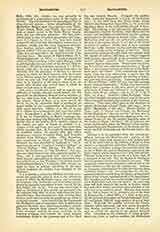

MacNeven, WILLIAM JAMES, distinguished Irish-American physician and medical educator, b. at Ballynahowna, near Aughrim, Co. Galway, Ireland, March 21, 1763; d. at New York, July 12, 1841. His ancestors were driven by Cromwell from the North of Ireland where they held large possessions to the wilds of Connaught. William James MacNeven was the eldest of four sons. At the age of twelve he was sent by his uncle Baron MacNeven, to receive his education abroad, for the penal laws rendered education impossible for Catholics in Ireland. This Baron MacNeven was William O’Kelly MacNeven, an Irish exile physician, who for his medical skill in her service had been created an Austrian noble by the Empress Maria Theresa. Young MacNeven made his collegiate studies at Prague. His medical studies were made at Vienna where he was a favorite pupil of the distinguished professor Pestel and took his degree in 1784. The same year he returned to Dublin to practice. A brilliant career opened before him in medicine, but he became involved in the revolutionary disturbances of the time with such men as Lord Edward Fitzgerald, Thomas Addis Emmet, and his brother Robert. He was arrested in March, 1798, and confined in Kilmainham Jail, and afterwards in Fort George, Scotland, until 1802, when he was liberated and exiled. In 1803, he was in Paris seeking an interview with Bonaparte in order to obtain French troops for Ireland. Disappointed in his mission, Dr. MacNeven came to America, landing at New York on July 4, 1805.
In 1807, Dr. MacNeven delivered a course of lectures on clinical medicine in the recently established College of Physicians and Surgeons. Here in 1808, he received the appointment of professor of midwifery. In 1810, at the reorganization of the school, he became the professor of chemistry, and in 1816 was appointed in addition to the chair of materia medics. In 1826 with six of his colleagues, he resigned his professorship because of a misunderstanding with the New York Board of Regents, and accepted the chair of materia medica in Rutgers Medical College, a branch of the New Jersey institution of that name, established in New York as a rival to the College of Physicians and Surgeons. The school at once became popular because of its faculty, but after four years was closed by legislative enactment on account of interstate difficulties. The attempt to create a school independent of the regents resulted in a reorganization of the University of the State of New York. Dr. MacNeven’s best known contribution to science is his “Exposition of the Atomic Theory” (New York, 1820), which was reprinted in the French “Annales de Chimie”. In 1821 he published with emendations an edition of Brande’s “Chemistry” (New York, 1829). Some of his purely literary works, his “Rambles through Switzerland” (Dublin, 1803), his “Pieces of Irish History” (New York, 1807), and his numerous political tracts attracted wide attention. He was co-editor for many years of the “New York Medical and Philosophical Journal”.
JAMES J. WALSH

